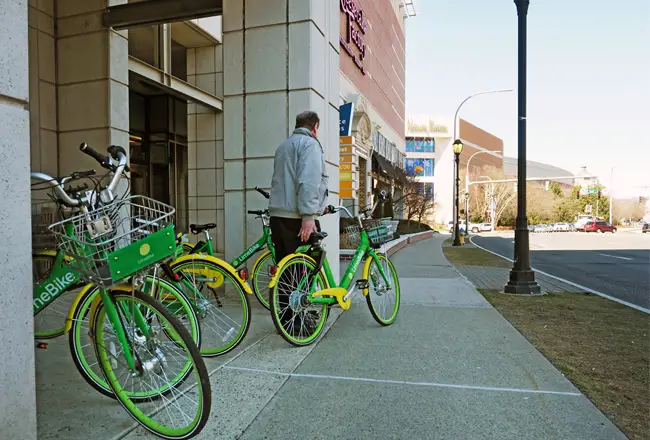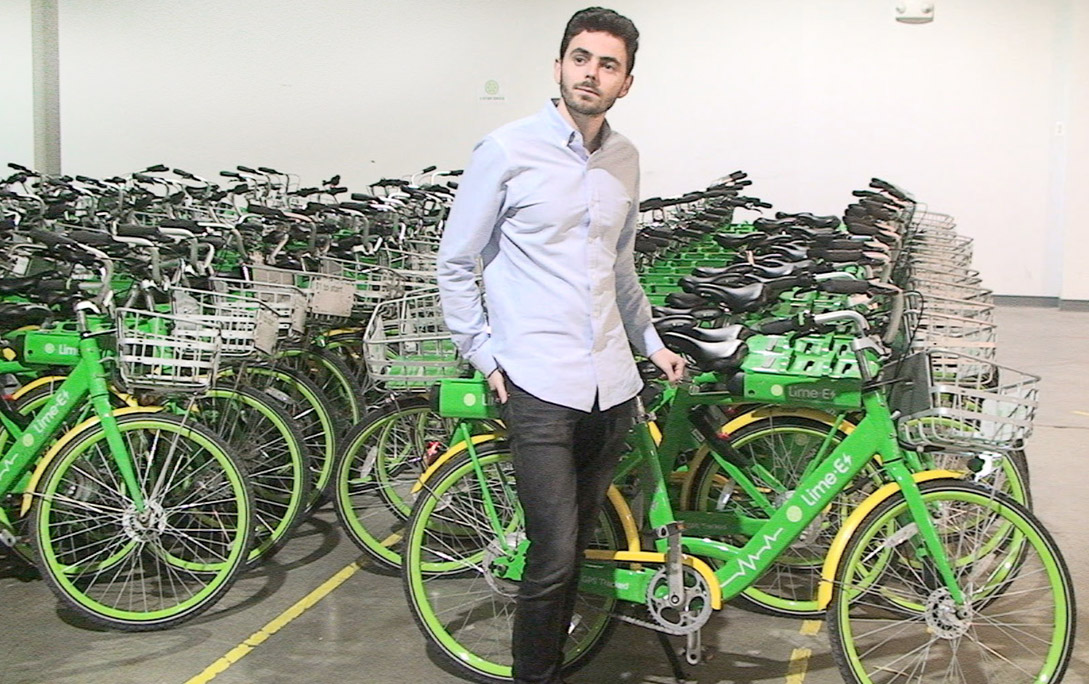There was no fooling as April 1 neared, the date when bike-share company Lime would begin replacing some of its fleet of 300 pedal bikes in White Plains with electric pedal-assist bikes in a soft launch.
The formal introduction of the pedal-assist bikes was planned for May 1 in White Plains while Lime continued to wait for a go-ahead from Yonkers officials to add the powered bikes to its fleet there.
Lime, which last August shortened its company name from LimeBike, is one of the major international players in the bike- and scooter-sharing industry along with companies such as Uber, Mobike, Ofo and Bluegogo. After announcing in February that it had closed on $310 million in new financing, Lime”™s value was placed at $2.4 billion. The company reported that about 10 million people have taken about 34 million rides on its bikes and scooters in the 15 countries where it provides service.
“We”™ve seen about 86,000 trips from 28,000 riders in Yonkers (and) we”™ve seen more than 40,000 trips from 9,000 riders in White Plains, and these are only on pedal bikes,” Gil Kazimirov, New York general manager of Lime, told the Business Journal during an interview at the expansive warehouse space used by the company on Fullerton Avenue in Yonkers. Lime started service in Yonkers last May and last June in White Plains.

Kazimirov explained that the pedal-assist bikes being introduced in White Plains are powered by a lithium-ion battery and have a small electric motor that adds extra thrust to what”™s being supplied by the rider.
“It lightly supports your effort. It”™s not a motorbike. It doesn”™t replace your effort, but as you pedal you feel a forward thrust,” he said. The extra thrust makes it easy to get up hills or even coast along at a steady speed on level terrain. “It opens up biking to older people, perhaps people who don”™t want to sweat on their way to work. It opens up biking to younger people who may not think of biking as engaging.”

Kazimirov said that more people are willing to try a pedal-assist bike than a pedal-only bike.
The electric pedal-assist bikes have a range of about 60 miles before the battery dies, according to Brett Swanson, Lime”™s community affairs manager who gave a briefing to the White Plains Common Council during a recent work session. He said that there is a speed sensor, which removes the electric power when the bike reaches 14.8 miles per hour.

Lime will use field operations teams to replace depleted batteries with fully charged ones and bring the old batteries back to its Yonkers facility for recharging. The operations teams, patrolling in vans, help ensure that bikes are in appropriate places throughout the cities and repositioned when they”™re left in places they shouldn”™t be. If a broken bike is spotted, it”™s picked up and brought back to Yonkers where a team of mechanics can make needed repairs.
People who want to use a Lime bike open a smartphone app, which displays the locations of the nearest bikes. They use the same app to unlock the bike, pay for it and even find recommended places to park the bike when their ride is over.
“On our pedal bikes, it”™s a dollar to unlock for 30 minutes and on our electric bikes it”™s a dollar to unlock and 15 cents a minute, which is the same pricing for our electric scooters,” said Kazimirov. “Most trips are between 10 and 15 minutes long, so on pedal bikes you pay a dollar and on our electric bikes and electric scooters you pay somewhere between $2 and $3.50.”
Lime has a system to send its people out to address complaints within a few hours. When the company launched service in Yonkers, some of its bikes were vandalized.
“Since then, vandalism has decreased very substantially to being almost insignificant in terms of our overall fleet,” Kazimirov said. “People get used to seeing the bikes around them. They realize this is here to stay and they realize this is something useful for them, their community, their family, their friends ”¦ so it”™s not in their interest to vandalize.” Dealing with vandalism is not unique to Lime and not at all confined to Westchester. A European bike-sharing company, Gobee.bike, had to abandon its operations in Paris, Rome and Brussels when thousands of bikes were either vandalized or stolen.
Lime is looking at the possibility of expanding its Westchester presence, Kazimirov told the Business Journal.
“Many towns have seen the success of the bike-sharing program in Yonkers and White Plains and have shown interest in bringing Lime bikes and scooters to their towns,” he said. “Roughly 40 percent of our trips start or end at a transit hub, suggesting that a lot of people want to use the bike as part of a longer commute and to kind of close the gaps in their current transportation options.”
Lime also is making an effort to partner with local businesses, Swanson told the Common Council. He said Lime has been reaching out to storeowners, asking them to allow clusters of Lime”™s bikes to be placed at their locations. Swanson said this would help bring foot traffic to the stores because, in addition to showing up on Lime”™s app, the location would be promoted on Google Maps.
Kazimirov sees a bright future for Lime”™s lime green bikes and scooters on local streets. In addition to bikes, Lime has a supply of the e-scooters in its Yonkers warehouse.
“People are sick of sitting in traffic, sick of congestion and waiting and paying for parking and they want an alternative that”™s affordable, that”™s convenient and that”™s environmentally sustainable to get them around their cities.”






















